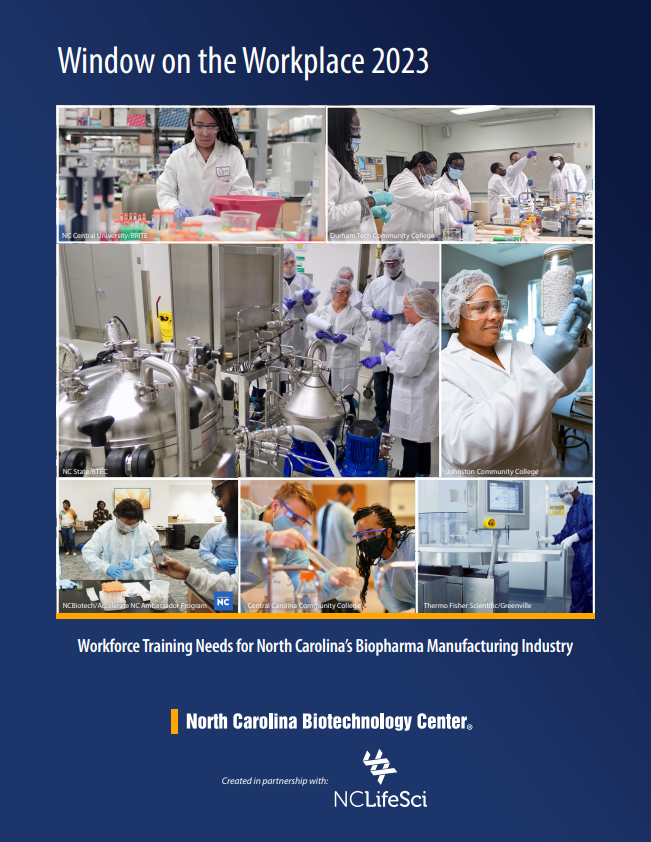
New report assesses workforce needs of NC biopharmaceutical manufacturers
North Carolina’s booming biopharmaceutical manufacturing industry will need at least 8,000 new workers by the end of 2026.
Will the state be able to provide that workforce? And how so?
These are among the questions addressed in a new report, Window on the Workplace 2023, Workforce Training Needs for North Carolina’s Biopharma Manufacturing Industry. The 57-page report, published by the North Carolina Biotechnology Center in partnership with NCLifeSci, the NC Life Sciences Organization, is publicly available on the NCBiotech website.
“As its name implies, this report provides an invaluable window into the current and anticipated needs of North Carolina biopharmaceutical manufacturers,” said Laura Rowley, Ph.D., vice president of life science economic development for NCBiotech. “This type of assessment is essential to inform strategy for the continued success of employers, training partners and job seekers in the state.”
North Carolina's investments in education and workforce training in recent decades have helped attract dozens of biopharmaceutical manufacturers and thousands of high-paying jobs to the state, and more resources will be needed to develop sufficient talent for the sector, said Laura Gunter, president of NCLifeSci, a member-supported trade association that promotes the state’s life sciences industry.

“With a projected industry need for 8,000 new workers by 2026, it will be critical for us as a state to meet this challenge,” Gunter said. “NCLifeSci will share this report with our policy leaders in the hope that it will help the state direct the resources needed to meet this demand for talent most effectively."
Fifth report in a series
The report is the fifth Window on the Workplace report published since 1997. The last report was published in 2020.
The newest report is based on a 2022 survey of 33 biopharmaceutical manufacturing sites across North Carolina employing 13,786 people – representing 43% of the sector’s total employment in the state.
The sites included those manufacturing biologics, vaccines, cell- and gene-based therapies, regenerative medicines, biologics for R&D, pharmaceuticals, diagnostics, supplements and nutraceuticals. The study did not include sites manufacturing other life sciences products such as medical devices, laboratory supplies or equipment.
For the first time, a separate survey was sent to all educational institutions offering training programs specific to biopharmaceutical manufacturing. Representatives from five universities, 12 community colleges and the N.C. BioNetwork Capstone Center participated.
Collectively, the two surveys focused on seven goals:
- Securing an overview of biopharma manufacturing companies including site locations, product types and operations.
- Assessing current and future employment including number of employees, demographics, scientific and technical areas of work, number of new hires and turnover rate.
- Determining current and desired educational attainment and skills for employees.
- Evaluating current recruitment and hiring practices.
- Assessing company awareness of existing training programs and the desire to outsource training to them.
- Quantifying existing and future industry-relevant training capacity from continuing education through graduate degrees.
- Comparing industry’s workforce needs to training program capabilities to identify any gaps or mismatches.
Workforce challenges cited by the report include overcoming high employee-turnover rates that average 13.4%, expanding training programs that are already at full capacity, attracting more students to programs that are below capacity, and training a workforce that is more diverse, equitable and inclusive.
Focus on entry-level jobs
The report comes amid a spate of new or expanded biopharmaceutical manufacturing sites in the state. Between January 2020 and December 2022, companies announced 31 projects totaling nearly 6,200 new jobs and $7.6 billion in investment, and more announcements have come in 2023.
Altogether 108 biopharmaceutical manufacturing sites across the state employ more than 32,000 people at an average salary of $92,652, according to the report.
Many of the expected jobs to be created in the next few years will be entry-level positions, which pay an average salary of $51,142.
Students who complete training programs – from certificate courses to associate degrees, bachelor’s degrees and graduate programs – are likely to benefit from “a remarkably high placement rate for graduates” and rewarding career possibilities, according to the report.
“Biopharma manufacturing companies provide North Carolinians with meaningful work, competitive salaries and opportunities for advancement that rival any industry,” the report concludes. “These opportunities are increasing both in number and geographic diversity across the state.”
